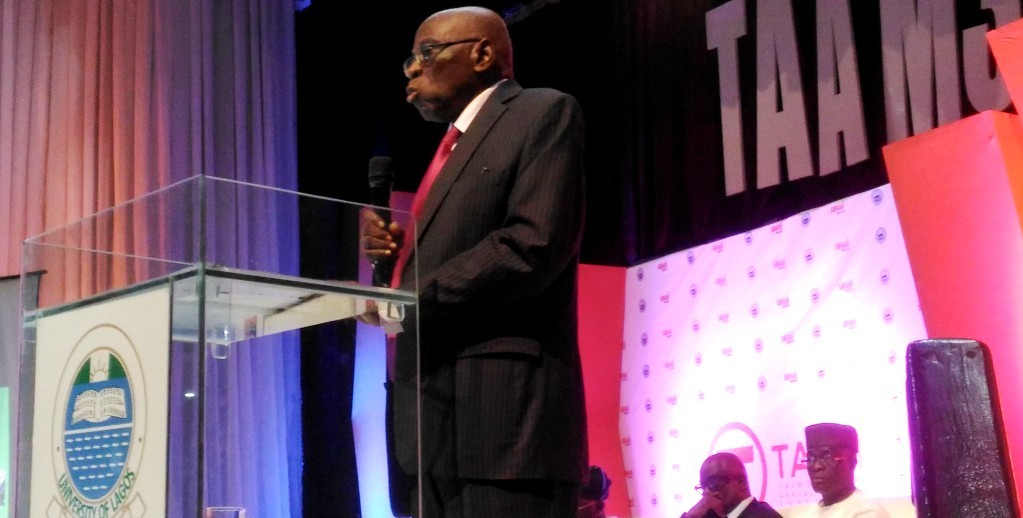Leading maritime industry stakeholders’ at the recent third Taiwo Afolabi Annual Maritime (TAAM) Conference have reviewed activities and key challenges hindering ease of doing business and came up with roadmap for reforms that will drive down port cost on businesses.
TAAM is a yearly summit organized in honour of leading maritime mogul, Dr. Taiwo Afolabi, Executive Vice Chairman of Sifax Group, by The Maritime Forum (TMF), a student association group of the University of Lagos in formed in 2015 for the purpose of engaging students who aspire to develop carriers in the Maritime Industry through organizing seminars, workshops, conferences and discussions on contemporary issues in the maritime sector.
This year’s theme; ‘Port Cost And port Charges: issues In The Port Reform Policy’, was diagnosed and presented by ageless maritime industry player and chairman, Nigerian Ports Consultative Council, Otunba Kunle Folarin at the JF Ade Ajayi Auditorium of the University of Lagos on Friday, August 17, 2018.
In his lead paper, Otunba Folarin averred that “The broad objectives of the reform have been hampered by several fundamental issues from conception, implementation processes, and operations of the concessioning regime. The imperative factors are the perquisite installing the concession were side lined for expediency. Port reform is all encompassing and must include the reform of all the key institutions in the port system. The challenges which were faced before by port authority from cargo handling operations were enormous”.
Continuing, he observed that “Port cost is a critical factor in the cost of doing business at the ports and not only port charges which relates to tariffs, levies and taxes. Computed costs of delays, documentation process, corruption, bureaucracy and lack of political will are some of the issues that created the problems and will continue to affect the achievement of the objectives”.
Explaining more on the strategies to reduce Port Cost, he called for deliberate government policy to among other things, reduce customs duties and taxes, set up an effective and efficient single window platform, and regulate the port and shipping sector (service and costs) port infrastructure development especially in port environment and common user areas.
He also noted the need for policy makers to see port community system as a framework for stake holder dialogue to improve service quality, reduce costs and encourage PPP in port business; invest in modern facilities & IT enablers; provide good quality human resources.
However, he listed 11 golden rules that must be addressed and adhered to in driving home the desired positive change in the industry as follows;
- Political will. All agreed processes and terms must be implemented without delay.
- Transparency must be entrenched in the concessioning and port reform process.
- Laws are made to promote port productivity and fair trade and competition and not to create monopolies.
- The landlord model must be administered in the very technical, ethical and objective structure. Concessionaires’ obligations are not to replace the responsibilities of the port authority, a modern productive infrastructure in an element in a LANDLORD MODEL.
- Port reform must be total and all inclusive of the key players who provide and consume port services including Nigerian Customs Services, statutory agencies, freight and logistics operators, and law enforcement agencies.
- The port authority must monitor performance and compliance of their own obligations as well as those of the concessionaires and other services providers in the enforcement of the Concession agreement.
- Both the technical and economic regulation enforcement guidelines that protect and ensure the realization and sustenance of the objectives of the Reforms must be established.
- Major restructuring of the port industry must commence with the review of the applicable laws and building of capacity for the management and staffs of the Nigerian Ports Authority, Nigerian Maritime Administration and Safety Agency, The Nigerian Customs Service and the Nigerian Shippers Council.
- The terminal operators must consent to yearly operational plans that can be measured.
- The economic regulators must issue guidelines that are open, transparent and enforceable. Its operations must exhibit very professional ethical behaviour and must not be compromised.
- Corruption which is clearly endemic in port must be challenged, and documentation process must be IT compliant.
Otunba Kunle Folarin made it clear that “If the port industry truly deserves to be productive, competitive and earn a hub status in the region, it must reform and stop deluding itself that it’s on course otherwise Nigerian Ports will continue to perform at best a little above average”.
However, he argued that “The colossal growth in traffic, environment and empowerment which we deserve will forever elude Nigeria unless the entire port industry is reformed to meet the performance level of the ports in the sub-region now husbanding Nigeria destination cargo traffic”.
“There is much to do to achieve the objectives of building an efficient productive and competitive Ports environment. The Reforms must start now in an all inclusive way. It must be total. That is the only way, and that is the way forward,” he summed up.
Key panelists who hailed the presentation including Chief Adebayo Sarumi, former boss of both Nigerian Shippers’ Council (NSC) and Nigerian Ports Authority (NPA), Prince Olayiwola Shittu, former President of ANCLA and a host of others stressed the need for immediate review of port charges in line with current global maritime realities. All maritime agencies and leading industry players were in attendance. The host, Dr Taiwo Afolabi was represented by his daughter, Miss Miriam Afolabi at the conference.









